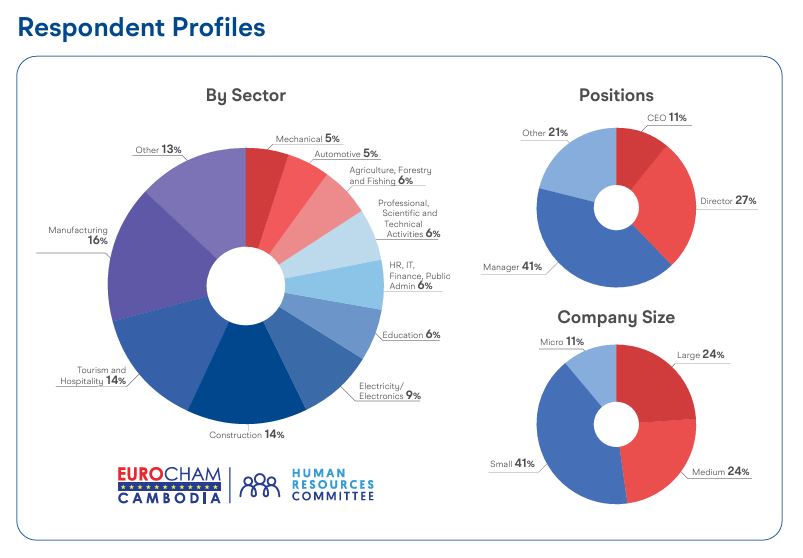Cambodia Investment Review
The European Chamber of Commerce in Cambodia (EuroCham), in partnership with the Swiss Agency for Development and Cooperation (SDC) and Swisscontact, has released a comprehensive Skills Gap Assessment Survey for 2024.
The study, conducted from February to April 2024, identifies significant skills shortages and training priorities across key sectors, including construction, electrical, manufacturing, mechanics, and tourism & hospitality. Despite positive growth projections, Cambodian companies face substantial challenges in recruiting qualified employees, emphasizing the need for targeted training programs.
Key Findings and Industry Responses
The survey revealed that technical and soft skills training, particularly in leadership, quality control, and project management, are critically needed across sectors. Awareness of existing training opportunities remains low, especially among smaller companies. A significant portion of respondents expressed a preference for in-person training, with many willing to invest in employee development at a daily rate of $25-$100 per person.

Mr. Narath Chheav, Chairman of EuroCham’s Human Resources Committee, commented on the findings: “The survey underscores the urgent need for enhanced training programs. Addressing these gaps will not only improve workforce efficiency but also attract international investment, benefiting Cambodia’s economy as a whole.”
Challenges in Hiring and Training
Despite an optimistic outlook for business growth, with 62% of companies planning to expand their staff in 2024, 74% reported difficulties in finding qualified employees. Common challenges include location-specific labor shortages, under-qualified staff, high salary expectations, language proficiency issues, and limited job applications for certain positions.
Ms. Sokha Suy, Managing Partner of HRINC (Cambodia), highlighted the impact of these challenges: “The hiring difficulties faced by companies are a clear indication of the existing skills gap. There is a pressing need for both technical and soft skills training to bridge this gap and support the country’s economic growth.”

Sector-Specific Insights
The survey’s sector-specific analysis identified unique skills gaps and training priorities:
- Construction: Leadership and project management were identified as critical skills, with a strong focus on safety management and quality control.
- Electrical: Leadership and electrical skills, alongside project management and data analytics, were highlighted as essential.
- Manufacturing: Leadership, quality control, and supply chain management emerged as top priorities.
- Mechanics: Quality control, assembling, and welding were identified as key skills, with a notable emphasis on project management.
- Tourism & Hospitality: Customer service, hospitality, and language fluency were prioritized, reflecting the sector’s focus on direct customer interactions.
Ms. Jose Vahl, Managing Director at Analytics & Insights Asia, emphasized the importance of sector-specific training: “Tailoring training programs to meet the unique needs of each sector will ensure that employees acquire the necessary skills to excel in their roles and contribute to their companies’ success.”
Investment in Employee Development
The survey also explored companies’ willingness to invest in employee training and development. Nearly half of the respondents were unaware of existing training options, with larger companies more likely to have participated in training programs compared to smaller enterprises. The findings suggest a need for increased awareness and accessibility of training opportunities.
The EuroCham committees suggested that lack of awareness of training options and associated costs might contribute to the uncertainty regarding acceptable daily training fees. They recommended leveraging the Skills Development Fund (SDF) administered by the Ministry of Economy and Finance (MEF) to cover training costs, thereby reducing financial barriers for companies.

Implications for Future Training Programs
The survey results indicate a preference for in-person and in-company training methods, with a significant portion of respondents willing to invest in training fees. Large companies showed a higher propensity to increase employees’ salaries post-training, reflecting a commitment to employee development and retention.
The committees highlighted the importance of aligning training priorities with industry needs and international standards to ensure Cambodia’s labor market remains competitive and appealing to foreign investors. They also suggested that integrating quality control elements into existing training plans, particularly in the tourism & hospitality sector, would enhance service excellence.
The EuroCham 2024 Skills Gap Assessment provides valuable insights into the current state of Cambodia’s labor market, identifying critical skills gaps and training priorities across key sectors. The findings underscore the importance of targeted training programs and strategic collaborations to enhance workforce capabilities and support the country’s economic growth. By addressing these gaps, Cambodia can cultivate a skilled workforce that meets the evolving needs of its economy, ensuring long-term prosperity and competitiveness.





